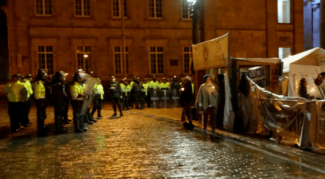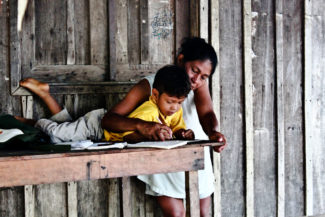Columns & Blogs
Columns & Blogs
The empty land déjà vu: The Constitutional Court can prevent us from going back a decade
By Diana Isabel Güiza Gómez |
"An important proportion of the large concessions of empty land between 1849-1872 was for cinchona bark extraction (...) Among the bark sellers that obtained concessions on empty land, there were people who had significant fortunes, and other that had been State high officials or had links to government. Among them were also investors and foreigners. Other export products had a similar weight such as tobacco, rubber, indigo plans, and coffee (...)"
Toxic Injustice
By Helena Durán |
Toxis are everywhere. They are in pesticides that end up in our food and our water; they are in plastics, electronics, toys, clothes, decorative paints, mattresses and in the chemicals used in gold mining and fracking.
The déjà vu of untitled lands: the Constitutional Court can prevent us from returning a century
By Ana Jimena Bautista, Diana Isabel Güiza Gómez |
"A large proportion of the untitled land concessions between 1849-1872 was for the extraction of cinchona bark (…) Among the merchants of the bark who obtained concessions were persons with significant fortunes, and others who had been high officials of the State or had ties to the government. Among them there were also foreign investors. Other export products such as tobacco, rubber, indigo and coffee had a similar fate (...)
Zidres and peace: an oxymoron
By María Paula Saffon Sanín |
With the dynamics of the Peace Accord, we have lost sight of the Constitutional Court's decision on the Zidres Law.
The post-agreement or the next day
By César Rodríguez-Garavito (Retired in 2019) |
As many of us who voted YES and others who voted NO, I was hopeful about a peace accord supported by many. Not by all, because no war has ended in unanimity, but supported by critics and defenders of the previous accord that had sought intermediate solutions to complex dilemmas such as the sanctions for those responsible of serious crimes.
Eviction of the peace camp broke regional, national, and international laws
By Dejusticia |
Our lawyer Anna Joseph wrote a blog for the Huffington Post on the eviction of the peace camp in Bogota, explaining the numerous national and international laws that were not respected during the dismantlement. The blog was published in Spanish by Las 2 Orillas.
What Else Happened in the U.S. Last Tuesday?
By Ana María Ramírez |
Everyone is talking about Trump’s victory, but what else happened in the US on November 8th?
The new agreement with the FARC and the changes it proposes for drug policy
By Isabel Pereira Arana |
Drug policy in Colombia is subject, at least politically, to the margin of action provided by the Havana Agreement on illicit drugs. A few days ago Colombians found our about the new agreement, and the scope of the changes incorporated after the proposals of the No campaign.
New agreement and disagreement
By Nelson Camilo Sánchez León |
Accounting for the proportions, the equivalent to the construction of an avenue in a few days that later completely collapsed in Japan was for us the discussion and agreement of the peace accord in Havana.
An agreement about the agreement
By Rodrigo Uprimny Yepes |
The new accord collected the main objections of the NO campaign given that in only one important topic (political eligibility) there were no significant changes. But the new text also maintained the essence and structure of the previous accord.
The Best Possible Accord
By César Rodríguez-Garavito (Retired in 2019) |
Much has been debated about what is the best peace accord possible. Humberto de la Calle said the answer was the last one; now he argues that it is the new one. The most skeptical sectors of the NO said it is neither one or the other.


